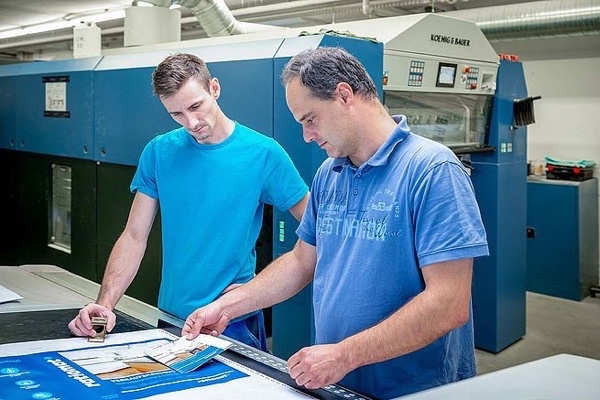Offset Printing
Oskar Görner thrives with a Rapida 106

Wednesday 28. October 2020 - It is almost exactly one year since a Rapida 106 started production for Oskar Görner in Chemnitz. The five-colour press with inline coater and extended delivery is the largest sheetfed offset press in use at the company, and easily surpasses the machinery used at all the other commercial printers in the city in terms of sheet format.
For Oskar Görner, a family business with 25 employees and a history extending back more than 125 years, the Rapida 106 is, first and foremost, the key to significantly increasing printing capacity. The boost in performance can primarily be attributed to high production speeds and fast makeready. While two shifts used to be fully occupied with print production, a quarter of that time has now been freed up for additional print jobs and/or special finishing tasks. This has allowed the level of in-house value creation to be increased accordingly. Inline finishing with matt, gloss or scented coatings has meantime become a daily routine, with the coater also being used for both die-cutting and perforating. The conversion work required for this is completed in a matter of minutes.
More products per sheet
When the time for a new investment came, managing director Daniel Fitzner took a close look at the products available from a range of manufacturers. The relative proximity to the manufacturing plant was one factor that made a sheetfed offset press from Radebeul particularly appealing. Furthermore, the Rapida 106 offered a number of impressive technical features. These included the automatic washing of the coating unit, fast and simple coating forme changes, inline colour control, fully automatic plate changing and the larger format of 750 × 1,060 mm.
The extra three to five centimetres it offers over the predecessor press are especially valuable for the company. For some calendar formats, the number of pages available from a sheet can be doubled from six to 12. When producing newspaper inserts and some packaging jobs, too, each sheet can now accommodate two, or even four, more products.
This all brings immense benefits for Oskar Görner. As a full-range commercial printing company, it handles a broad range of commercial products such as newspaper inserts, leaflets and catalogues. Light packaging is another important area. Run lengths fluctuate from just 300 and up to 100,000 sheets. Leaflets incorporating a perforated postcard have already been produced in runs of 300,000 to 400,000 copies. The companys customers come from all over Germany and its neighbouring countries.
Everything for vinyl
One interesting element of the product portfolio is the packaging used for vinyl records. Oskar Görner supplies the whole range of print products associated with record covers, from standard outer sleeves for one or several records, including any special finishes required, to gatefolds, inner sleeves in various forms, labels and booklets.
A label punch and a specific combination of post-press machines are used to automate the production process after printing to the greatest extent possible. These special products are primarily ordered by agencies or the pressing plants themselves. Some collectors, as Daniel Fitzner has heard, even place record covers on display in their original cellophane wrapping, never listening to the actual record.
Print production picks up
After a noticeable downturn in business in the spring, as experienced by many commercial printers, the print production volumes at Oskar Görner have already returned to last years levels. This has undoubtedly been aided by the balanced product mix and the diverse industries in which customers are active. At the same time, the company offers finishing with a special anti-bacterial protective coating to preserve the hygienic cleanliness of the print products for a longer period. Innovations like this have been well received by customers.
Along with its new Rapida 106, the post-press department at Oskar Görner also boasts state-of-the-art technology which accounts for a total production floor space of almost 2,000 m2: Saddle-stitching, die-cutting, folding and cutting machines stand alongside other equipment for embossing, perforating and numbering. The companys special flair, however, stems from its unique location. The historic factory halls dating from the early 20th century belong to a complex that has a heritage listing as an industrial monument.
